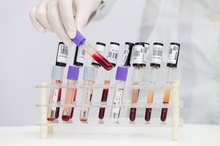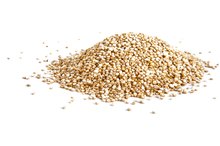Can Diet Increase Albumin Levels?
Albumin is a protein manufactured in the liver and stored as a particle in the blood. Serum albumin serves the basic function of holding fluid in your blood through the process of osmosis. Low levels of albumin cause fluid to seep into the "third space," the area between cells. This causes complications called edema or ascites, inappropriate fluid retention and bloating. Inadequate dietary protein can affect the amount of albumin in your body, resulting in major health implications.
Protein Intake and Albumin
It is necessary for you to consume the eight indispensible amino acids in order for your body to have all the building blocks it needs to synthesize albumin. Without enough protein, your albumin levels may drop. In 1989, the "Journal of Clinical Nutrition" published a study on albumin in rats. The study found that higher protein diets promoted albumin synthesis and increased albumin levels, even in rats with kidney disease who were losing albumin in urine. Rats with protein-restricted diets underproduced albumin and had low body stores.
- It is necessary for you to consume the eight indispensible amino acids in order for your body to have all the building blocks it needs to synthesize albumin.
- The study found that higher protein diets promoted albumin synthesis and increased albumin levels, even in rats with kidney disease who were losing albumin in urine.
Serum Albumin
Hepatic Encephalopathy Low-Protein Diet
Learn More
Low serum albumin can be the result of a multitude of medical conditions. If you are experiencing unusual fluid retention, resulting in significant weight gain, talk to your doctor to pinpoint the cause. The normal range for serum albumin is typically 3.5 to 5.4 milligrams per deciliter, although this range may vary depending on the laboratory. Albumin levels may appear normal in malnourished patients who are also dehydrated. It is important to look at this lab value in the context of your diet, medications and overall health. Seek the advice of a knowledgeable health-care provider to determine appropriate treatment options.
- Low serum albumin can be the result of a multitude of medical conditions.
- It is important to look at this lab value in the context of your diet, medications and overall health.
Animal Protein Sources
Protein comes from animal products such as meat, fish, dairy and eggs. These are considered complete or "high quality" proteins because they contain all eight essential amino acids in one source. Consume 10 to 35 percent of your daily calories as protein to meet the recommended dietary allowance for this nutrient, says the Centers for Disease Control and Prevention.
Vegetarian Protein Sources
BUN Vs. Serum Creatinine: Which Is Better for Renal Insufficiency?
Learn More
If you follow a vegetarian or vegan diet, get your protein from a variety of sources to ensure sufficient intake of the indispensible amino acids. Plant sources of protein include beans, soy, lentils, nuts and seeds. These are not complete proteins, though, so combine different plant-based protein sources throughout the day to obtain all of the necessary amino acids.
Related Articles
References
- "The Journal of Clinical Investigation"; A Low Protein Diet Restricts Albumin Synthesis in Nephrotic Rats; Kaysen, G.A., et al.; May 1989
- Medline Plus: Albumin -- Serum
- Icahn School of Medicine at Mount Sinai. Albumin - blood (serum) test Information.
- University of Rochester Medical Center. Albumin (Blood).
- National Kidney Foundation of Arizona. Symptoms & Diagnosis.
- National Institute of Diabetes and Digestive and Kidney Diseases. Albuminuria: Albumin in the Urine. Published October 2016.
- Moman RN, Varacallo M. Physiology, Albumin. In: StatPearls [Internet]. Treasure Island (FL): StatPearls Publishing; 2019 Jan-. Updated November 13, 2018.
- Lala V, Minter DA. Liver Function Tests. In: StatPearls [Internet]. Treasure Island (FL): StatPearls Publishing; 2019 Jan-. Updated April 29, 2019.
Writer Bio
Anastasia Climan is a registered dietitian and active member of the Academy of Nutrition and Dietetics. Her experience includes managing a medical nutrition grant for HIV, developing menus for local preschools and coaching clients on nutrition through her business, The Princess Prescription. Her numerous articles have appeared on Jillian Michaels and other health sites.








